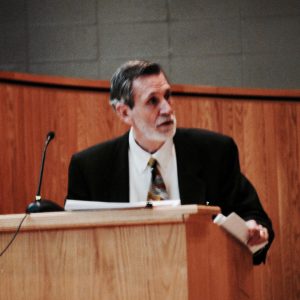
Wednesday night’s Burrillville Town Council meeting hearkened back to the early days of public opposition against Invenergy’s $700 million fracked gas and diesel oil burning power plant planned for the town. Back then, we saw a public that was distrustful of the town council, and a town council that was not receptive to the idea of opposing the power plant, early on claiming to be powerless against the combined might of Invenergy, Governor Gina Raimondo’s office and regulators.
The town council then took the position, contrary to the Open Meetings Act, that people in the town were only allowed to talk about issues and subjects that were specifically listed on the town council’s agenda, cutting off discussion about the Algonquin pipeline if the power plant was on the agenda, or vice versa. In December of last year, calls from the town council to trust them elicited groans of dismay from the audience.
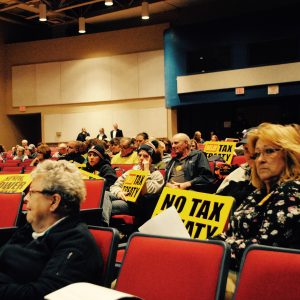 Then, in April of this year, it was learned that the town council had been in secret negotiations for a tax treaty with Invenergy for months. The town council was still forcing residents to only speak about “agenda items” and working hard to curtail public discussion, contrary to the Open Meetings Act. The growing resistance in Burrillville to the power plant felt disempowered. Not only were they fighting a multi-billion dollar power plant company funded by a Russian oligarch, they were fighting both the state and local governments. The fight seemed impossible and trust between the town council and residents couldn’t be worse. Or so they thought.
Then, in April of this year, it was learned that the town council had been in secret negotiations for a tax treaty with Invenergy for months. The town council was still forcing residents to only speak about “agenda items” and working hard to curtail public discussion, contrary to the Open Meetings Act. The growing resistance in Burrillville to the power plant felt disempowered. Not only were they fighting a multi-billion dollar power plant company funded by a Russian oligarch, they were fighting both the state and local governments. The fight seemed impossible and trust between the town council and residents couldn’t be worse. Or so they thought.
At an April 14 town council meeting Council President John Pacheco said that the town council learned about Invenergy’s plans when everyone else did, during a press conference held by Governor Raimondo announcing the plant, saying, “As a town council, we did not know this plant was actually going to happen until the Governor announced it.”
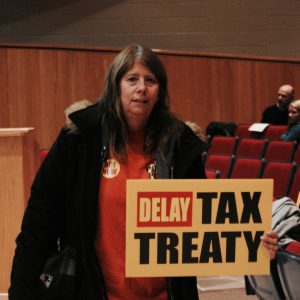 This turned out to be inaccurate. Videos of town council meetings from February and March of 2015, on the town council’s own website, showed the town council and state legislators paving the way for the controversial Invenergy power plant months before the governor officially announced the project. Over time some of the details about how Invenergy approached the town came to light, but the complete story, and who opened what doors to the power plant, has yet to be revealed.
This turned out to be inaccurate. Videos of town council meetings from February and March of 2015, on the town council’s own website, showed the town council and state legislators paving the way for the controversial Invenergy power plant months before the governor officially announced the project. Over time some of the details about how Invenergy approached the town came to light, but the complete story, and who opened what doors to the power plant, has yet to be revealed.
The town council eventually came to a public position regarding the power plant: The town council would put on a public display of strict neutrality, taking no position for or against the power plant, until after all the advisory opinions from various town boards had been completed. This was so as to appear to not influence the outcomes of the various advisory opinions and give the Energy Facilities Siting Board (EFSB) a reason to suspect that the opinions might be slanted in some way.
 State legislators Cale Keable and Paul Fogarty went a different route. They entered legislation at the state level that if passed, would give voters in Burrillville the ability to approve or reject any tax treaty negotiated between the town council and Invenergy.
State legislators Cale Keable and Paul Fogarty went a different route. They entered legislation at the state level that if passed, would give voters in Burrillville the ability to approve or reject any tax treaty negotiated between the town council and Invenergy.
The bill passed the House and was due for consideration and a vote in the Senate when the town council passed a resolution in opposition to the Keable Bill at the 11th hour, giving the Senate Judiciary Committee enough of a reason to vote down the bill. The relationship between the town council and residents was now overtly acrimonious. There were tears from Town Councilor Kimberly Brissette Brown and anger and accusations from Town Councilor Donald Fox. Residents spoke of feeling “humiliated” at the State House as the press release announcing the resolution was sprung on them by Senators Frank Lombardi and Steven Archambeault, who treated the residents with risible condescension.
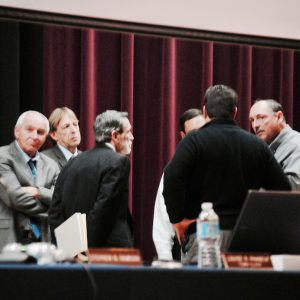
Since that low point, the town council and residents worked to rebuild trust. Residents by this time were long past being held to arbitrary and incorrect readings of the Open Meetings Act. They spoke their minds, expressed their concerns and the town council, to their credit, finally seemed to be listening. They seemed to come together as a town when Governor Gina Raimondo visited to hear resident concerns about the power plant.
After the lengthy process of creating the advisory opinions concluded, the town council passed an extremely robust resolution opposing the power plant and asked other city and town councils in and around Rhode Island to join them in opposition. Many already have and many more are considering joining Burrillville in opposition to the plant. But the Burrillville Town Council’s opposition came with a caveat: They still planned to sign a tax treaty with Invenergy, a tax treaty that the town residents want to hold off on signing.
At issue is the timing. The town council maintains that they have negotiated a solid tax treaty that will protect the town in the event the power plant is built, and guarantee a steady stream of income to the town. The residents want to wait until after the EFSB decides on Invenergy’s application before signing any treaty. Right now, the power plant’s application is suspended, pending Invenergy’s search for a new source of water. Signing the tax treaty, say residents, gives Invenergy extra leverage in negotiating a deal with another municipality, like, let’s say, Woonsocket, to purchase water. The town’s opposition to the power plant must be unified and consistent. Opposing the power plant with a resolution sends one message, signing a tax treaty with Invenergy sends another.
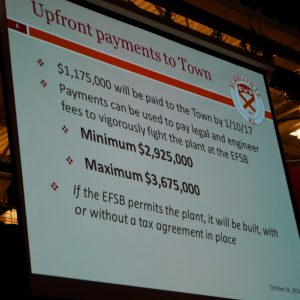 At Wednesday night’s hearing, Attorney Michael McElroy, who negotiated the tax treaty, said that the opposing the power plant and signing a tax treaty were not inconsistent actions and would not be seen that way. “I want to make it… clear that I see no inconsistency between entering into these agreements and dead set opposition to the plant,” said McElroy.
At Wednesday night’s hearing, Attorney Michael McElroy, who negotiated the tax treaty, said that the opposing the power plant and signing a tax treaty were not inconsistent actions and would not be seen that way. “I want to make it… clear that I see no inconsistency between entering into these agreements and dead set opposition to the plant,” said McElroy.
But McElroy is a lawyer. He is not a business man trying to buy water to cool a power plant. What businessman wouldn’t mention the tax treaty as proof that the town council is actually okay with having the power plant sited in their town? The resolution in opposition will be described behind closed doors as merely political theater, something to satisfy the rubes while the real business of government is imposed by the movers and shakers in secret meetings paid for with political contributions.
McElroy did his best to sell the tax treaty to the residents. He spent 45 minutes outlining the deal, expressing the need for a treaty. One reason McElroy gave, that didn’t sit well with residents, was that, “I want to get paid.” The money generated by this tax treaty will give the Town of Burrillville the money it needs to fight the siting of the power plant all the way to the Supreme Court, if need be. The lawyers and experts needed to fight such a case cost money, said McElroy, who included himself in those expenses.
McElroy suggested that if the town council did not pass the tax treaty, Invenergy might pull it off the table. He assured the audience that contrary to what Conservation Law Foundation senior attorney Jerry Elmer says, the plant will be built without a tax treaty in place.
Residents weren’t buying it. Towards the end of what turned out to be a five hours plus meeting, it was obvious that the town’s people were not willing to drink the tax treaty Kool-Aid. Forty people spoke against passing the tax treaty. Two spoke in favor of trusting the town council and McElroy’s advice.
Ultimately the town council recessed without doing anything on the tax treaty. There is a plan to take up the issue again next week.
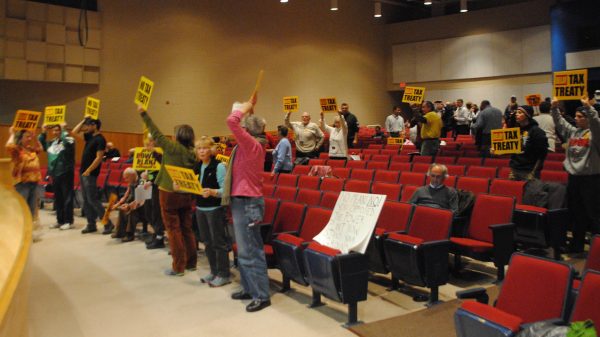
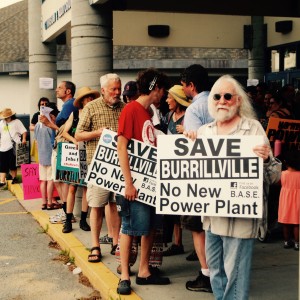 On Wednesday the Burrillville Town Council will be discussing the proposed tax treaty with Invenergy, the company that wants to build a $700 million fracked gas and diesel oil burning power plant in the town. The timing of this discussion could not be worse. Invenergy just successfully petitioned the Energy Facilities Siting Board (EFSB), the governmental body tasked with with approving or rejecting the plant, for a 90 day extension on their application. Because Invenergy can’t find the water it needs to cool the plant, for the first time the company is on the ropes. Approving a tax treaty at this time will give the company a much needed win, and might turn the tide in their favor.
On Wednesday the Burrillville Town Council will be discussing the proposed tax treaty with Invenergy, the company that wants to build a $700 million fracked gas and diesel oil burning power plant in the town. The timing of this discussion could not be worse. Invenergy just successfully petitioned the Energy Facilities Siting Board (EFSB), the governmental body tasked with with approving or rejecting the plant, for a 90 day extension on their application. Because Invenergy can’t find the water it needs to cool the plant, for the first time the company is on the ropes. Approving a tax treaty at this time will give the company a much needed win, and might turn the tide in their favor.
Invenergy is searching for the water they need. An Access to Public Records Act (APRA) request from RI Future has revealed that Woonsocket Mayor Lisa Badelli-Hunt’s office has had two meetings with Invenergy officials. On September 7 there was a 30 minute meeting and on September 20 there was a 60 minute meeting. Other meetings may have occurred since then. We know from statements made at the October 3 Woonsocket Town Council meeting that these discussions were not about siting the plant in Woonsocket. These discussions, assumed to be ongoing, are about water. Whatever bargaining position Invenergy has in their discussions with Woonsocket, or any other entity contemplating providing the water Invenergy needs, will be enhanced by the existence of an approved tax treaty.
Passing a tax treaty will send mixed signals to the rest of the state. On September 22 the Burrillville Town Council issued a strong statement in opposition to the proposed power plant. They sent out missives to cities and towns through Rhode Island, Connecticut and Massachusetts asking for other town and city councils to pass resolutions in solidarity with Burrillville. So far at least four municipalities have done so, Lincoln, Glocester, North Smithfield and Middletown. How foolish will these councils feel if Burrillville proceeds to negotiate with the company they’ve asked for support in opposing? How eager will other municipalities be to pass their own resolutions going forward?
Jerry Elmer, senior attorney for the Conservation Law Foundation (CLF) believes that the Town of Burrillville “is under zero obligation to enter into a tax treaty,” adding, “By ‘zero obligation,’ I mean: zero legal obligation, zero ethical obligation, zero political obligation. The Town has tax laws on the books, and those existing tax laws will determine Invenergy’s tax obligation if there is no tax treaty.
“Invenergy can (and likely will) make all kinds of threats about what will or will not happen in the absence of a tax treaty, but the threats are empty,” continues Elmer, “The bottom line is that: (a) The Town can simply choose not to enter into a tax treaty. (b) If the Town chooses not to enter into a tax treaty there is nothing that Invenergy can do. (c) If the Town chooses not to enter into a tax treaty, it is virtually certain that Invenergy will go away.
“But can’t Invenergy sue the Town of Burrillville to try to force the Town to enter a tax treaty?” asks Elmer, before answering, “Technically, the answer is “yes,” Invenergy can sue the town – and, yes, the town would have to spend some money to defend such a lawsuit. But Invenergy could not win such a lawsuit. Remember what law school professors like to say: ‘You can always sue.’ I can sue you for wearing a blue suit (or for your taste in movies). But just because one can bring such a stupid, frivolous lawsuit does not mean that one can win such a stupid lawsuit.
“So, too, with Invenergy and a tax treaty. The Town of Burrillville can decline to enter into a tax treaty with Invenergy, and there is nothing Invenergy can do to force the issue.
“The message to each and every member of the Town Council is simple, so simple it can be put into a single sentence: ‘Vote down any tax treaty.’ Or: ‘Don’t even vote on a tax treaty.’ Or: ‘Don’t vote on a tax treaty, and don’t approve a tax treaty.’ None of those sentences is complicated; none of those involves weird, technical legal mumbo-jumbo. Everyone can understand the point.”
 Attorney Alan Shoer, of Adler Pollock & Sheehan, has been representing Invenergy during their application process in front of the EFSB. A look at Shoer’s bio page on his law firm’s website runs down his skills and accomplishments. Shoer is presented as an expert in “all aspects of energy, environmental, and public utility law.” He has “experience in wind, solar, hydro and other renewable energy matters,” and “has represented developers, investors, contractors, utilities, and municipalities in several successful and innovative sustainable energy projects.”
Attorney Alan Shoer, of Adler Pollock & Sheehan, has been representing Invenergy during their application process in front of the EFSB. A look at Shoer’s bio page on his law firm’s website runs down his skills and accomplishments. Shoer is presented as an expert in “all aspects of energy, environmental, and public utility law.” He has “experience in wind, solar, hydro and other renewable energy matters,” and “has represented developers, investors, contractors, utilities, and municipalities in several successful and innovative sustainable energy projects.”
Note what Shoer does not include in his online resumé: Anything at all to do with his strong advocacy for companies that want to expand Rhode Island’s dependence on fracked gas.
Like Governor Gina Raimondo, who never misses an opportunity to publicly champion wind and solar power but downplays her support of fracked gas, and like Senator Sheldon Whitehouse who humbly accepts the laurels heaped upon him for his environmental activism in the Senate but can’t find the time to publicly oppose fracked gas infrastructure in his own state, Alan Shoer seems to want his paid advocacy for fossil fuels companies like Invenergy to go unnoticed.
And this is for a good reason: Twenty years from now, no one will want their name to be attached to the moldering LNG monstrosities, brown fields and contaminated properties left in the wake of the coming fossil fuel collapse. Who wants to tell their children and their grandchildren that they helped destroy the environment when they knew the world was under threat and they knew that they were championing a dying and deadly industry? Carefully shaping their public image today is a way, hopes Raimondo, Whitehouse and Shoer, of shaping the way history will judge them.
But we won’t let the world forget their part in this, will we?
This is why Invenergy would be foolish in suing Burrillville. Not only can they not win, as Jerry Elmer points out above, but in doing so they will be exposing themselves as the villains they are. Burrillville may have to spend money defending themselves against such a lawsuit, but I will bet that most or all of the money Burrillville needs to defend themselves could come from something like an online GoFundMe effort. Fracked gas is enormously unpopular in New England, and becoming more unpopular by the day. Only those who continue to believe the lies of the fossil fuel companies, (and they’ve been lying for decades about climate change, as it turns out) that is, the most gullible or ideologically pathological, believe that fossil fuels are the future.
About 244 years ago, a group of Rhode Islanders in Warwick stood up against British tyranny and torched the Gaspee, starting a series of events that led to the American Revolution. Today, in Burrillville, a group of Rhode Islanders is standing up to the fossil fuel oligarchy and when they win, it will mark a turning point in the climate change battle, and the effects could be as significant as those at Gaspee Point in 1772. Rhode will become, in the words of Timmons Roberts, writing for the Brookings Institute, “a leader of a new energy age for the U.S.,” instead of “a middling actor locked into fossil fuel infrastructure for decades.”
The Burrillville Town Council has an opportunity Wednesday night to save the town, the state, and the world.
Be there.
]]>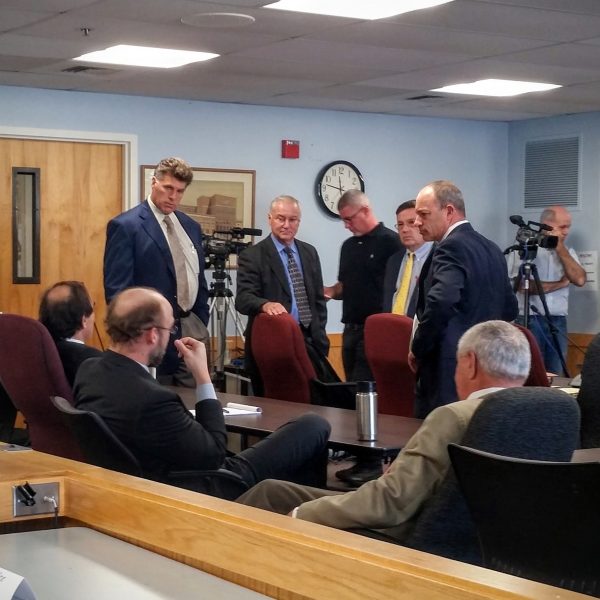
Amid audience shouts of “Shame on you!” and “Merry Christmas, Invenergy!” the Energy Facilities Siting Board (EFSB) voted unanimously to grant Invenergy a 90 day suspension on their application to build a $700 million fracked gas and diesel oil burning power plant in Burrillville, effectively quadrupling Invenergy’s previous 30 day extension.
Once Pascoag voted to terminate their letter of intent with Invenergy to provide water to cool Invenergy’s proposed power plant, and Harrisville also declined to provide water, the company asked for 30 days to find an alternative source. They were granted a 30 day extension 30 days ago and despite negotiating with Woonsocket for the water needed to oil the power plant, nothing concrete was presented at today’s hearing.
Instead we heard Invenergy lawyer Alan Shoer claim that Pascog’s termination of their letter of intent came “very late in the process, after almost a year of working with Invenergy.” This made it impossible for Invenergy to come up with an alternative plan, complained Shoer. Attorney Jerry Elmer with the Conservation Law Foundation (CLF) later countered that “Invenergy made a careful, conscious, deliberate decision to file an application with the EFSB that had very tight, strict, statutory deadlines for things happening, before they had a secure water source… That was Invenergy’s sole election.”
In other words, continued Elmer, Invenergy knew that their non-binding letter of intent “may not result in a water source.”
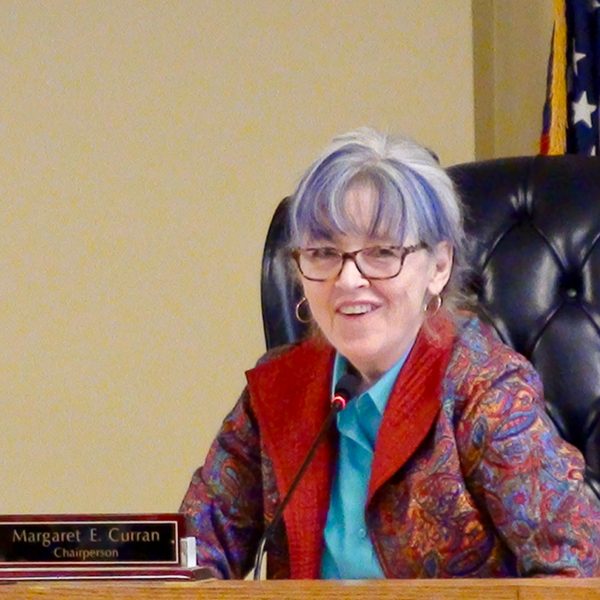
The 90 day suspension comes with the minor caveat that Invenergy provide a status update in 60 days. The update must show concrete progress in securing a water source, though it is unclear what penalty Invenergy may face if they do not deliver an update that is satisfactory to the board. Criteria for the update seemed sketchy.
In 90 days, Invenergy must be able to present a water source to the board, along with a plan to transport the water to the location of the power plant. Burrillville recently provided a list of criteria that board member Janet Coit suggested would need to be satisfied for the suspension to be lifted. The criteria includes the source of the water, the means of transmission of the water, and the disposal of waste water, among other concerns.
In the event that Invenergy is unable to come up with a water supply, Coit suggested that the EFSB might be open to further suspensions at that time, effectively suggesting unlimited time for Invenergy to get their application in order, unless the board decides to dismiss the application per the motions from the Conservation Law Foundation and the Town of Burrillville.
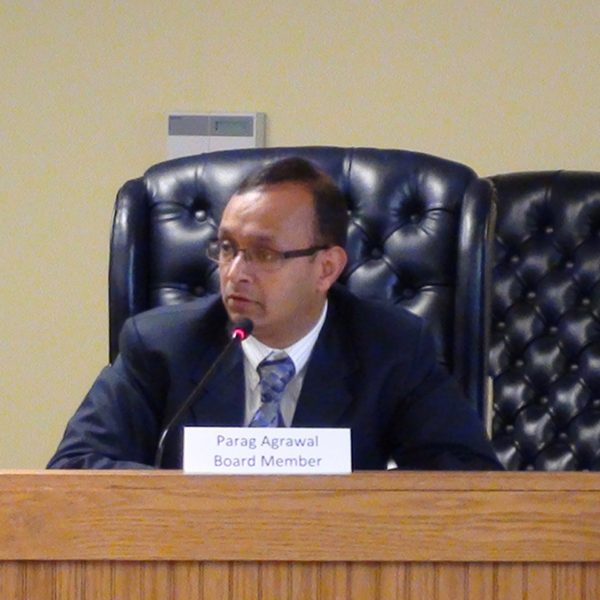
Lawyer Michael McElroy gave a stellar speech to the board in support of dismissing Invenergy’s application, even going so far as to quote Marvel Comics’ Stan Lee. McElroy also directly confronted Chair Margaret Curran and board members Parag Agrawal and Janet Coit about concerns that the EFSB’s process “may be dictated by” Governor Gina Raimondo.
“The Town of Burrillville does not want this plant,” said McElroy, “I think that’s been made clear to this board. This plant would be a polluting monster that violates the town’s comprehensive plan and zoning ordinances and would negatively impact impact the quality of life for all Burrillville residents.
The EFSB, continued McElroy, “has been given extraordinary legal powers to grant permits that would otherwise be granted by my client, the Town of Burrillville. You have in essence become, among other things, the town’s planning board, its zoning board and its building inspector. But with such great power comes great responsibility. Your most important power and responsibility is to fully, fairly and impartially evaluate all of the issues that come before you after hearing from all of the parties on those issues.”
“The residents of the town and my clients have become concerned that throughout this process that the board’s votes on this process may be dictated by the governor, who has repeatedly and publicly expressed her support for this project despite the town’s overwhelming opposition. This board’s ill-advised and illegal previous attempts to silence the town and prevent it from being heard today only reinforces that concern.
McElroy urged the board to dismiss the docket, not suspend it. “Suspending the docket instead of dismissing it would give Invenergy what amounts to a gift of an indefinite suspension,” said McElroy. “The town has been fighting this battle now for almost a year at great monetary and emotional expense.”

McElroy’s fiery comments stand in sharp contrast to those of Jerry Elmer, who added that though the lack of water was a major issue that precipitated the motion to suspend, there was also the issue of a lack of information from Invenergy that caused six of the twelve advisory opinions to the board to be submitted incomplete.
After the board rendered its decision those watching the proceedings left the room singing “We shall overcome.”
Those from Burrillville I talked to were angry and disappointed by the ruling. They feel the process is corrupt and stacked against them. They feel that they are being forced to attend yet more town and city council meetings throughout the state in an effort to garner support and prevent the sale of water to Invenergy. Their holidays will now be filled with research, activism, environmental reports and endless meetings in towns and cities throughout the state and beyond to garner support for their cause and to prevent Invenergy from securing a source of water.
Yet though the process seems corrupt and Invenergy seems intent on grinding away their resolve, the people I talked to were adamant that they would not give up or stop fighting.
]]>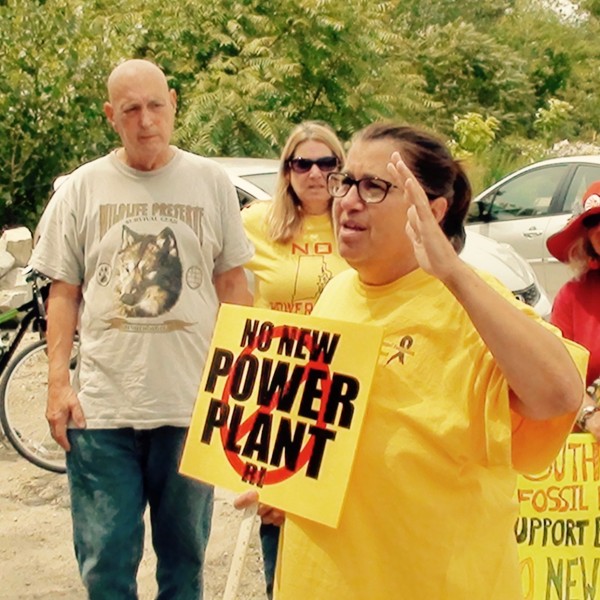 The Conservation Law Foundation‘s (CLF) senior attorney Jerry Elmer filed a Motion to Dismiss today with the Energy Facility Siting Board (EFSB) in the case of Invenergy’s $700 fracked gas and diesel oil burning power plant planned for Burrillville. CLF’s motion is broader than the one filed by the Town of Burrillville, which concentrated on the fact that Invenergy to date has supplied no information on where the water to cool the power plant will come from, making it impossible to assess the project.
The Conservation Law Foundation‘s (CLF) senior attorney Jerry Elmer filed a Motion to Dismiss today with the Energy Facility Siting Board (EFSB) in the case of Invenergy’s $700 fracked gas and diesel oil burning power plant planned for Burrillville. CLF’s motion is broader than the one filed by the Town of Burrillville, which concentrated on the fact that Invenergy to date has supplied no information on where the water to cool the power plant will come from, making it impossible to assess the project.
In addition to the water issue, CLF’s motion is based on the lack of advisory opinions from multiple agencies, due to Invenergy’s lack of providing needed information. This is CLF’s second motion to dismiss. As this new Motion to Dismiss says in its conclusion, “Back in January, CLF argued that this docket should be closed due to inadequate information from Invenergy.
“Invenergy’s Application lacked enough details for the parties, including CLF, to assess and respond to its proposal. The EFSB voted to let the process take its course. The Board noted that ‘further information’ might at some point be ‘necessary to conduct a thorough review and make an informed decision…’ It added that discovery would be available as part of the process.
“In the intervening eight months, twelve agencies and subdivisions have attempted to conduct the thorough reviews and make the informed decisions demanded of them by the Energy Facility Siting Act and the Board. Discovery has occurred. And Invenergy has failed to provide enough information for the agencies and subdivisions to issue fully informed advisory opinions. The process has taken its course, statutory deadlines have passed, and there still is not enough information for the Board to do its job. Invenergy’s failure to provide adequate information violated the Energy Facility Siting Act, it precluded the agencies and subdivisions from doing their jobs, and it precludes the EFSB from fulfilling its statutory mandates, Enough is enough: Invenergy’s application must be dismissed.”
UPDATE: See Jerry Elmer’s blog post about the motion here.
]]> Because Invenergy “has either refused or is unable to provide timely information regarding its proposed water supply… its Application should… be dismissed” writes Attorney Michael McElroy, representing the Town of Burrillville, in a motion filed with the Energy Facilities Siting Board (EFSB) today.
Because Invenergy “has either refused or is unable to provide timely information regarding its proposed water supply… its Application should… be dismissed” writes Attorney Michael McElroy, representing the Town of Burrillville, in a motion filed with the Energy Facilities Siting Board (EFSB) today.
Invenergy is proposing to build a $700 million fracked gas and diesel oil burning power plant in Burrillville, a project that has the support of both Governor Gina Raimondo and the Providence Journal. The residents of Burrillville and every environmental group in Rhode Island oppose the plan.
Invenergy’s original plan was to pump water from a well contaminated with MTBE, but on Aug 19 the Pascoag Utility District voted unanimously to deny Invenergy access to that water. Under EFSB rules and the Act that established the EFSB, “Applications must include information regarding all required support facilities, including water resources.” Without such information, writes McElroy, “The Application cannot be evaluated in a meaningful way.”
McElroy’s motion to dismiss also notes that the Town of Burrillville, the Burrillville Planning Board and the Burrillville Zoning Board of Review “have formally requested information regarding Invenergy’s water source on multiple occasions” and that “Invenergy repeatedly promised to provide such information, but to date has failed to do so.”
“In fact,” writes McElroy, “in a Motion for Extension filed by Invenergy last Friday, Invenergy stated that its ‘expects’ to have a water source ‘within the coming weeks.’ This is uselessly vague.
Jerry Elmer, Senior Attorney for the Conservation Law Foundation (CLF), “supports the Town of Burrillville’s Motion to Dismiss the Invenergy case, which was filed today. In fact, CLF has been preparing its own Motion to Dismiss on the same grounds as the Town’s Motion: The Energy Facility Siting Board (EFSB) process cannot go forward without the required Advisory Opinions from the Town; and the Town cannot prepare the required Advisory Opinions because Invenergy has failed to provide legally required information.
“Invenergy’s application to build a new fossil fuel power plant in Burrillville is incomplete, and the EFSB must dismiss the application. CLF argued its first Motion to Dismiss last January because Invenergy’s application was incomplete then; and CLF will continue to argue the same point now: Invenergy’s application remains incomplete. It is past time for the EFSB to dismiss this case.”
]]>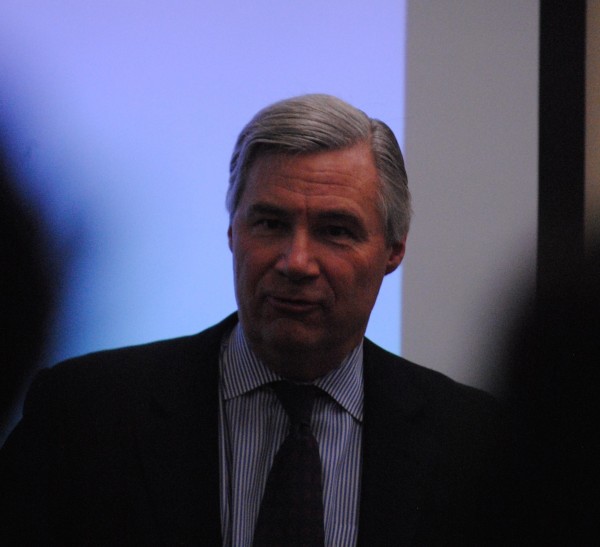
United States Senator Sheldon Whitehouse has a national, and even international, reputation as a climate champion, noted Rhode Island Senate President M Teresa Paiva-Weed as she introduced him to to the nearly 150 people gathered in Newport for a community dinner and Q&A. Paiva-Weed talked up Whitehouse’s concern for his constituents, saying, “Someone like Sheldon makes it a point to be home and to have a focus on the issues at home.”
But to the residents of Burrillville who drove for over an hour through rush hour traffic to attend the dinner, Whitehouse hardly seems focused on “the issues at home” and in fact, his own words belie that. His international reputation as an environmental champion is of small comfort to the townspeople fighting Invenergy’s $700 million fracked gas and diesel oil burning power plant.
Whitehouse touted his environmental concerns in his opening remarks, saying, “The good news is that… the [climate] denial operation really is collapsing. You can feel it visibly. We’re at the stage where the CEO of Exxon has had to admit, ‘Okay, climate change is real, and we’re doing it and we want to get something done.’”
Climate change, says Whitehouse, “is going to hit home for Rhode Island in a really big way and I want to make sure that I’ve done everything that I possibly can to make sure that we are as prepared for it as we can be in the Ocean State.”
Richard Dionne, vice president of the Burrillville Conservation Commission was called on by Whitehouse to ask the first question.
“When discussing the most influential senators from Rhode Island on environmental quality issues, your name is often brought up in the same sentence as our former Senator John H Chafee,” said Dione, “Not bad company to be in if I do say so myself.”
“Really good company,” agreed Whitehouse.
Dione continued, “However, our Senator Chafee would be rolling over in his grave if he knew that a 900 megawatt fracked gas power plant being proposed by Governor Raimondo was to be sited smack dab in the middle of the John H Chafee Heritage Corridor in the northwest corner of Rhode Island, on the shared border with neighboring states Connecticut and Massachusetts.
“This area has been recently designated as part of the National Park Service. The approximately 13,000 acres of protected forests, recreational areas, wetlands and conservation areas is absolutely the most inappropriate area for this type of project.
“Every environmental organization in the state of Rhode Island has come out against the project,” continued Dione, “including the Environmental Council of Rhode Island, the Audubon Society, the Nature Conservancy, Blackstone Heritage Corridor, the list goes on and on, I have a list right here…”
“I know the list,” said Whitehouse.
“At many of the public hearings I attend, invariably the question gets posed to me, ‘Where is our environmental Senator on this issue and what is he doing for his constituents in Burrillville?’ A town which, by the way, has supported your election in 2006 and 2012.
“So my question is Senator Whitehouse,” said Dione, winding up, “What answer can I bring back to the people of Burrillville, and can you commit this evening to opposing this power plant?”
“The short answer is,” said Whitehouse after a short pause, “There is a process…”
“Here we go,” said a woman at my table with open disdain.
If there was a wrong answer to give, this was it. Everyone who attended Governor Gina Raimondo’s appearance at the Burrillville High School has heard this answer before. No one takes “trust the process” seriously. It’s political dodge ball.
Conservation Law Foundation (CLF) attorney Jerry Elmer has spoken eloquently about the process. “Remember that the reason – the raison d’etre – that the General Assembly created the EFSB (Energy Facility Siting Board) was precisely to take these energy siting decisions away from the Town Councils and town planning boards,” wrote Elmer.
RI Senator Victoria Lederberg, who got the EFSB legislation through the General Assembly 30 years ago, called the siting board concept “one-stop shopping” for power plant developers. Climate change, environmental concerns and the health and safety of residents didn’t seem to be high on the General Assembly’s priorities when the EFSB was formed.
The process renders the opinion of ordinary townsfolk essentially meaningless, said Burrillville Planning Board attorney Michael McElroy. “The EFSB can take [our opinion], they can take it in part, or they can reject it.”
“There is a process,” said Whitehouse, “taking place for [the power plant] through the state Energy Facility Siting Board. They take sworn testimony, as I think you know. There are a whole bunch of local environmental groups that are intervened into that proceeding. The Conservation Law Foundation has come down from Boston to intervene in that proceeding. They have witnesses.”
Senator Whitehouse is incorrect here. The only environmental group certified as an intervenor in the EFSB proceedings is the CLF. The Burrillville Land Trust, Fighting Against Natural Gas (FANG), Burrillville Against Spectra Expansion (BASE) and Fossil Free Rhode Island were denied intervenor status, as it was felt that their interests would be seen to by the CLF.
“It’s essentially an administrative trial that is taking place,” continued Whitehouse, “I have confidence in that process. I have confidence in Janet Coit at DEM (Department of Environmental Management) who by virtue of being the DEM director is on the Energy Facility Siting Board. I have confidence in Meg Curran, chairman of the Public Utilities Commission (PUC) who by virtue of being chairman chairs that Siting Board, and there’s going to be somebody from the Department of Administration…”
Associate Director of the Division of Planning, Parag Agrawal, is the third member of the EFSB.
“It’s a process I’ve worked with from my earliest days,” said Whitehouse, “when I first came as a young lawyer to Rhode Island I worked in the Attorney General’s office and I practiced representing the people before the Public Utilities Commission.
“So I have confidence in the process.
“Congratulations,” added Whithouse, “The opposition to Invenergy, I think, has won every round. Burrillville said ’No’ on planning, Burrillville said ‘No’ on zoning, the water board said ‘No’ on water, so I think you’re, yeah, it’s a process and I know it would be easier to just yell about it but it’s a process that I think is honorable and will come to the right result.
“So I want to focus my efforts on where it will make the biggest difference. I know we’ve had some conversation, repeatedly, but I still am of the view that, with the force and strength that I have available to me, I want to apply every bit of that force and strength to the battle in Washington, which if we win it, will be immensely significant, not just to Burrillville but to all of Rhode Island and to the country and the world.
“So, sorry that I don’t have more to give than that, but I do think that I give pretty well at the office with what I do on this issue. Thank you for bringing it up though, I appreciate it.”
Burrillville resident Lynn Clark was called on to ask the next question. This seemed like a coincidence, but in fact, half the questions asked concerned the power plant in Burrillville, in one way or another.
Clark rose and with only the slightest hint of nervousness in her voice, said, “My name is Lynn and I come from the northwest corner of the state of Rhode Island. It has been my home all my life. I applaud you and I love the work you’re doing on the environmental front.
“In Burrillville, our little town has come together and we have come out strong against this giant plan. We have a lot of environmental groups [on our side], 23 currently, and we are working hard.
“I wish I could say that I am as confident in this process as you are, sir. It has been a scary process. We have been consumed by this process. I have been at every meeting, for hours, two or three meetings per week. Sir, this is a scary, scary process.
“We need a champion in Burrillville and we are asking you to please come see us. Please, come talk to us. If this Invenergy [power plant] gets built, the detriments to our little state will be just horrifying.”
Clark’s appeal to Whitehouse was raw and emotional. It’s the kind of speech people give in movies to roust tired champions into battle one final time.
But this wasn’t a movie and Whitehouse wasn’t willing to be the hero.
“I hear you,” said Whitehouse, once again echoing words Governor Raimondo used in Burrillville when she visited, “I can’t add much to what I’ve said to Richard. Thank you for taking the trouble to come down and share your passion.

“It is the National Heritage Corridor,” said Clark, not giving up, “We also have a boy scout camp up there, camp grounds… Have you been up to Burrillville?”
“Oh yeah,” said Whitehouse.
“Okay,” said Clark, “I hope you come visit us soon, sir. Thank you.”
Other questions came and went. Whitehouse was asked about the Supreme Court vacancy, grid security and the opioid epidemic. When Newport resident Claudia Gorman asked Whitehouse about the Federal Energy Regulatory Commission (FERC), he admitted that on the federal level, at least, he isn’t as certain about the integrity of the process.
“There have been several problems, at the federal level, with the approvals,” said Whitehouse, “They haven’t baked into their decision making what is called the social cost of carbon.” Whitehouse added that we don’t take seriously the problem of methane gas leaks, and that he held the first hearings on the issue of gas leaks and that we still don’t know the full extent of that particular problem…
The last question of the evening came from Cranston resident Rhoda Northrup. She rose as Whitehouse tried to bring the discussion to an end, and would not allow the dinner to end without asking her question.
“I do not live in Burrillville I live in Cranston,” said Northrup, “and what’s going on in Burrillville should not be completely on their backs. This is a global issue for all of us and if that power plant comes to our state of Rhode Island, it will set us back forty years. We will be committed for another forty years to a fossil fuel.
“That’s wrong.
“We need to move forward with wind and solar. And with all of that said, I would like to ask the senator if he has an opinion. With everything that’s been said tonight, ‘Do you have an opinion?’
“I know it’s a process,” said Northrup, “but that’s not an answer. Everybody’s telling us it’s a process. We know that. We’re walking the process. But we’re asking our leaders if they have an opinion. You must have an opinion.”
There was a short pause before Whitehouse answered.
“My opinion is that we must get off fossil fuels,” said Whitehouse.
“Thank you for that,” said Northrup.
But Whitehouse was’t finished. Lest anyone believe that by that statement Whitehouse was taking a stance against the power plant in Burrillville and matching action to his words, Whitehouse switched to his familiar political talking points.
“My opinion is that the best way to do that,” continued Whitehouse, “is to balance the pricing of fossil fuels, so that they are treated fairly in the marketplace. Right now they have a huge, unfair advantage because they don’t have to pay for the cost of the harm that they cause…”
]]>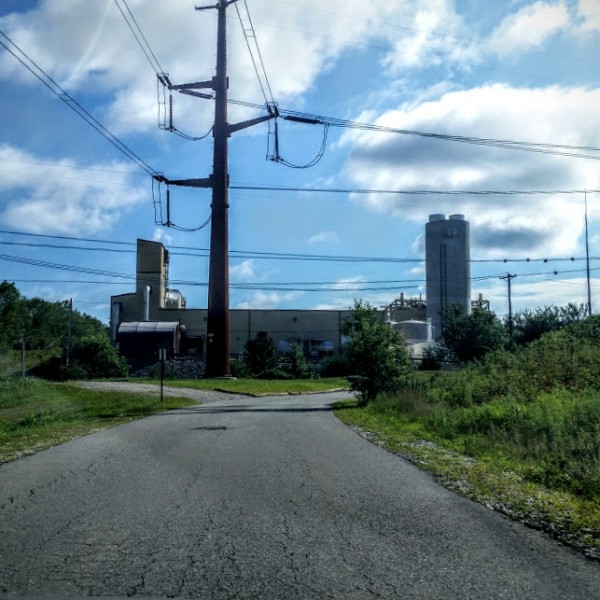
On the day the Rhode Island Senate Finance committee passed the legislation that would establish the Energy Facilities Siting Board (EFSB), Robert L Bendick Jr, the director of the RI Department of Environmental Management (DEM) asked, “I just wonder what’s going on here. What’s the driving force behind this?” [Providence Journal, April 11, 1986; pg A-15]
The question Bendick asked on April 9, 1986 strongly resonates today. Jerry Elmer, of the Conservation Law Foundation, said the EFSB “was designed to take the power to stop a proposal like Invenergy’s out of the hands of the local people… and put it into the hands of the EFSB.”
Governor Gina Raimondo refers to EFSB decision making as “the process” and asks us all to trust in it, but how are we to trust if we can’t tell if the intent of the process is to serve Rhode Islanders or to serve the energy industry?
What is going on here? Here’s some historical context.
Back in 1986, Ward Pimley, writing for the ProJo, wrote, “Sen. Victoria Lederberg, D-Providence, the sponsor, said the [EFSB] bill streamlines the approval process required for obtaining licenses to build major energy facilities for generation of electricity, treatment of liquefied natural gas, oil refineries and the like…”

Victoria Lederberg was an impressive woman and public servant. A judge, she “served as state representative from 1975-1983 ,representing the East Side of Providence, and state senator from 1985-1991… Lederberg was a trailblazer, becoming the first woman of Italian heritage to serve in the Rhode Island legislature.”
Pimley continues, “In previous testimony, Lederberg called the siting board concept ‘one-stop shopping,’ where interested developers could learn what they must do to obtain licenses and fulfill obligations to build. She said it removes jurisdictional overlapping among regulatory agencies.
“She said the bill recognizes the state’s need for ‘reasonably priced, reliable sources of energy’ and balances that with issues affecting public health and environmental impact.”
Nine years earlier, in his January 1977 inaugural address, Governor J Joseph Garahy outlined his ideas for the state’s energy objectives. Siting of energy projects heretofore had been haphazard, and based solely on the whims of industry. Garahy had a vision “to site energy facilities in light of state plans, rather than private industry decisions.” He was governor of a Rhode Island that was suffering from environmental mismanagement, and the new governor was hoping for a different approach. The EFSB, at its best, would be a realization of Garahy’s vision, but in an effort to please industry rather than regulate it, Garahy’s vision may have been compromised.
Public Utilities Commission] Chairman Edward F Burke, Pimley wrote, “testified earlier that the legislation is important because there are eight or nine potential applications for energy-generating facilities that could be built in some other state unless the licensing procedure were streamlined.
“He cited a $300-million facility proposed for Burrillville that should provide electricity by 1989 on property owned by Narragansett Electric as an example of the type of facility that can be built.”
This $300-million facility is the Ocean State Power plant, which currently uses 4 million gallons of water a day to cool its turbines.
Recognizing that the EFSB would allow industry to override the environmental concerns of the state, Sen. William C. O’Neill, today more famous as a South County bike path than a Democratic senator from Narragansett, objected. Here’s Pimley’s play-by-play of what he called a ‘hot debate’:
“You feel DEM is an obstacle,” O’Neill said. “You removed that obstacle, and you know it.”
“You’re absolutely incorrect,” Lederberg shot back.
“I’m concerned that you’re allowing other agencies to override DEM,” O’Neill said.
“I totally disagree,” Lederberg said. “This shares decision-making. DEM has an important role. That’s why we’ve made them one of the board members. It does not weaken the permit-granting power by DEM.”
Lederberg said DEM does not have veto authority to stop any project it wants, but it still is involved in the planning process.
Then Sen. David R. Carlin Jr, D-Newport, said the siting board can overrule decisions of other agencies.
“It seems it’s clearly overriding DEM,” he said.
O’Neill, seeing DEM Director Robert L Bendick Jr watching the proceedings, said he would vote for the bill if Bendick agreed that DEM’s interests would not be jeopardized by it, but committee chairman Donald R. Hickey, D-Providence, called for a vote.
“The bill was approved, 8 to 4.”
This is what prompted Bendick to ask, “What’s going on here?” adding, “If what they’re doing is overriding the department’s authority, I’m opposed to it.”
Months earlier, in an editorial, the ProJo had endorsed Lederberg’s proposal writing, “As a House member in 1979, Mrs. Lederberg sponsored a similar bill that died in the Senate. Former Gov. J. Joseph Garrahy, who supported the bill, issued an executive order embodying many of its details, but that wasn’t an adequate substitute for statutory enactment…
“Mrs. Lederberg says energy installations must be reviewed in terms of regional need and cost-effectiveness, not on the basis that Rhode Island must be totally self-sufficient in energy.” [Providence Journal February 17, 1986; page A-10] Note that Lederberg is not quoted as mentioning, and that the ProJo editorial seems uninterested in, environmental issues.
Pimley noted that the bill, as originally introduced by Lederberg, allowed the General Assembly to override an EFSB decision, but that provision was removed before passage because “it was no longer needed.”
Pimley also noted that “support for the legislation came from the Governor’s Office of Energy Assistance, the PUC and Narragansett Electric Co.”
Narragansett Electric is today a wholly owned sub-entity of National Grid.
Of special concern to all involved with the establishment of the EFSB was a proposal “to build twin natural-gas-fired plants in Burrillville. According to a plan disclosed Tuesday, the plants would be supplied by a new, 25-mile gas pipeline that would run from Sutton, Mass., to the Burrillville site and on to Cranston.” [Providence Journal, February 13, 1986; page A-14]
The very first application the EFSB took up was the Ocean State Power Plant in Burrillville.
]]> The Burrillville Planning Board meeting, held on Monday evening, was a confusing muddle that revealed the structural weaknesses of the “process” that Governor Gina Raimondo implored the people of Burrillville to trust in.
The Burrillville Planning Board meeting, held on Monday evening, was a confusing muddle that revealed the structural weaknesses of the “process” that Governor Gina Raimondo implored the people of Burrillville to trust in.
The board was meeting to vote to approve the final version of its required advisory opinion to the EFSB (Energy Facilities Siting Board) concerning Invenergy’s $700 million fracked gas and diesel oil burning power plant, a scheme that is wildly unpopular with Burrillville residents.
The powerlessness of a small, town appointed board in the face of a multi-billion dollar company with state government support was aptly demonstrated when board chair Jeffrey Partington lamented that “one of the weaknesses of this entire [process] is that we haven’t seen plans” from Invenergy.
The “process” is designed so that a town planning board has to decide to endorse or oppose a plan that will have enormous impact on the town, without seeing the actual plans.
This is by intent.
Conservation Law Foundation attorney Jerry Elmer has pointed out that the process “was designed to take the power to stop a proposal like Invenergy’s out of the hands of the local people… and put it into the hands of the EFSB.”
Hours of meetings and endless discussions have consumed the board’s time and the energy and efforts of local townsfolk. Yet the board’s own attorney, Michael McElroy, succinctly summed it up when he said, “Essentially our advisory opinion means nothing. It’s simply an advisory opinion. The EFSB can take it, they can take it in part, or they can reject it.”
At this meeting we learned that though Invenergy is confident that they can design the power plant to meet the noise ordinances set by the town, they have no intention of posting a bond to insure that this goal is met. An expert hired by the town has said that though he has never seen a power plant meet noise requirements so low and that such a thing has never been done, he believes it might be possible.
“It may be difficult and it may be expensive,” noise expert David Hessler cautioned, adding, “I think it can be done.”
Later in the same meeting Hessler admitted that he had “never seen a power plant meet the noise levels” but reiterated that he thinks this plant can be designed to do so.
Maybe this is why Invenergy won’t post a bond: What bonding company wants to insure a project that may well prove to be impossible? Not agreeing to post a bond may also be a legal strategy. The EFSB, when they decide on the final terms of the deal, might include a bonding that Invenergy agreed to, but more likely the EFSB will simply give Invenergy a waiver on the noise level, allowing the company to disregard Burrillville’s ordinance, without bringing up the bonding issue at all.
Why post a bond to meet a requirement you intend to have waived?
So all the sturm und drang over low octave vs. decibel limits on noise may well be for naught. “Essentially our advisory opinion means nothing,” said McElroy.
Here in Rhode Island we call that, “the process.”
Here’s the full video of the Burrillville Planning Board meeting.
]]> In response to the Massachusetts Supreme Judicial Court’s decision against National Grid’s plan to charge consumers to underwrite and guarantee profits for its proposed ANE pipeline, the Conservation Law Foundation (CLF) has moved to close the Docket on a similar proposal here in Rhode Island.
In response to the Massachusetts Supreme Judicial Court’s decision against National Grid’s plan to charge consumers to underwrite and guarantee profits for its proposed ANE pipeline, the Conservation Law Foundation (CLF) has moved to close the Docket on a similar proposal here in Rhode Island.
Closing the docket would essentially end National Grid’s plan. According to the motion, National Grid provided testimony in the Massachusetts case claiming that “the fate of the ANE Project is dependent on approvals of full cost-recovery in other New England states—especially Massachusetts, which National Grid assumed would provide a substantial portion of the financing for the proposed project.”
As National Grid further states, “If there is any possibility of less than full cost recovery over the entire term of the contracts, the Proposed Agreement has a negative expected value for the Company’s investors…” National Grid wants to place the risks of this investment on ratepayers, not its investors.
The motion to dismiss, filed by CLF attorneys Jerry Elmer, Megan Herzog and Max Greene, supplies several reasons supporting the contention that Docket 4627 needs to be closed in light of the Massachusetts decision.
The first reason is that the project cannot proceed without Massachusetts. “Massachusetts was to receive the lion’s share—more than 43 percent—of the Access Northeast project’s gas capacity,” says the motion to dismiss, “In effect, Massachusetts’ non-participation cripples the project.”
Even if National Grid decides to proceed with the motion, by deciding to actually assume the financial risks, says the CLF, that isn’t the plan as proposed in Docket 4627. The scheme, says the CLF, “is so substantially altered by [the Massachusetts opinion] that the Petition, as filed, fails to represent fairly the costs and benefits of the ANE Project.”
Without the State of Massachusetts buying in, “The resulting proposition is an entirely new, and raw, deal for Rhode Island. In effect, National Grid is now asking Rhode Island ratepayers to subsidize a project that it alleges will benefit all of New England; yet a substantial share of New England ratepayers—including millions of ratepayers in Massachusetts—will be insulated from bearing a proportional share of the risks of this experimental and uncertain scheme.”
Also, even though the Massachusetts decision was based on Massachusetts state law and has no direct legal bearing on Rhode Island, “the reasoning underlying the Massachusetts Supreme Judicial Court’s decision… applies with equal force here.”
Rhode Island has laws similar to those in Massachusetts regarding “the core principles of electricity market restructuring,” says the CLF, and approving National Grid’s plan “would undermine the main objectives of the [restructuring] act and re-expose ratepayers to the types of financial risks from which the Legislature sought to protect them.”
]]>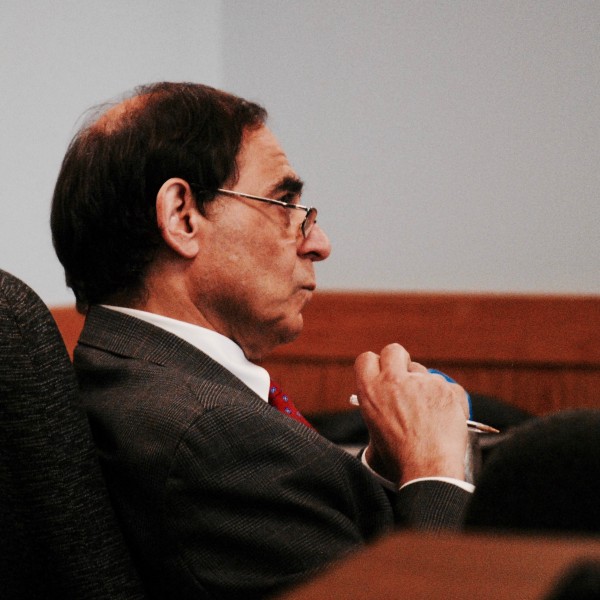
The Conservation Law Foundation (CLF) today presented its arguments against Invenergy’s proposed $700 million fracked gas and diesel oil burning power plant in a brief filed with the Rhode Island Public Utilities Commission (PUC). The PUC is charged with rendering an advisory opinion to the Energy Facilities Siting Board (EFSB) the board that will have the final say in whether the proposed plant gets built. In putting together their advisory opinion, the PUC will be considering briefs from the CLF, Invenergy, the Town of Burrillville and the Division of Public Utilities and Carriers (Division).
The PUC’s mandate is to “conduct an investigation … and render an advisory opinion” as to the “need for the proposed facility,” says CLF attorneys Max Greene and Jerry Elmer in their brief, quoting Rhode Island General Laws § 42-98-9(d). The CLF “therefore presented unrefuted evidence that shows the plant is not needed, in the form of testimony from expert witness Robert Fagan.”
Though Invenergy’s expert witnesses “profess to disagree” with Fagan, they argue that the plant will provide a “social surplus” of energy and not that the plant is actually needed, says the CLF in their brief. In the recent ISO-NE forward capacity auction, Invenergy only sold half its capacity. If you subtract out Invenergy’s contribution to the energy markets the region still has nearly 1,000 megawatts of excess capacity, says the CLF.
Further, Invenergy and the Division presented no evidence at the hearings that the plant is needed. Instead, Invenergy made the claim that if the power plant sold energy in an ISO-NE forward capacity auction, this proves the plant must be needed. The CLF argues that this is incorrect, maintaining that “… a CSO is not a showing of need but the result of a complex market mechanism that takes into account other factors such as cost.”
But even if we accept the “CSO equals need” argument, says the CLF, neither Invenergy nor the Division “has presented evidence to show that the proposed Invenergy plant is needed. This is because Invenergy has proposed a two-turbine, 1,000 MW plant but has not obtained a CSO for a two-turbine, 1,000 MW plant.” What Invenergy is defending is a one turbine plant, since that’s what sold at auction.
The PUC must consider the need of the power plant as proposed. What Invenergy has proposed is a two-turbine, 1,000 MW plant. As the CLF brief makes clear, “Invenergy has not obtained a CSO for a two-turbine, 1,000 MW plant,” it has, at best, demonstrated the need for a “485 MW project.”
“Not once does the EFSB Order describe the proposed Invenergy plant under consideration as a single-turbine, 485 MW generator. Instead, the Order says the proposed plant ‘will have a nominal power output at base load of approximately 850-1,000 megawatts” and that the plant will consist of two units. So defined, ‘the proposed facility’ and ‘the Project’ do not have a CSO.”
The PUC’s advisory opinion is due at the EFSB before final hearings start in September. The briefs from all intervenors are due at 4pm today (Thursday).
]]>